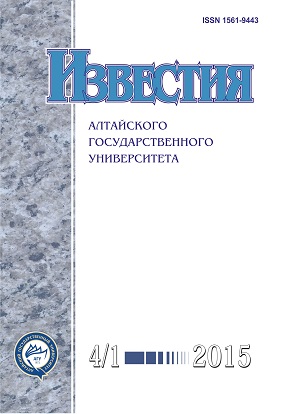Adaptation Strategies for the “Punished” People and Local Communities in Kazakhstan (1941–1953)
Abstract
The present article is devoted to the problems of social adaptation of the deported peoples and the interethnic relations with the local population. Historiographic myths about a deliberate ethnocide of the “punished” peoples from the side of Soviet state were criticized from the position of historicism. The article showed that the “punished” peoples were on the verge of survival in severe conditions of Kazakhstan exile, but the local population which sent all able-bodied men to the front was under the same conditions. Representatives of the deported peoples chose various strategies of adaptation and relationship with local Kazakhs and Russians. Germans, Turks, Greeks, Karachays and Balkars as earlier deported Poles and Koreans joined local society while Chechens and Ingushs kept to the line of opposition to other people and secret resistance to the authorities. The conditions of deportation strengthened the extent of ethnic consolidation of Chechens and Ingushs and that fact gave them serious advantages. It became in its turn a source of rigid interethnic conflicts. During the subsequent period the traditions of interethnic relations between representatives of the deported peoples, Kazakhs and Russians reserved steadily up to collapse of the USSR.
DOI 10.14258/izvasu(2015)4.1-20
Downloads
Metrics
References
Бугай Н.Ф. Лаврентий Берия Иосифу Сталину: «Согласно Вашему указанию». - М., 1995.
Сталинские депортации 1928-1953 гг. / сост.А.Н. Яковлев,Н.Л. Поболь, П.М. Полян. - М., 2005.
Герман А.А. Немецкая автономия на Волге. 1918-1941. - М., 2007.
Алексеенко М.А. История депортации немцев по документам Государственного архива Кустанайской области // Начальный период Великой Отечественной войны и депортация российских немцев: взгляды и оценки через 70 лет : материалы 3-й международной научно-практической конференции. Саратов, 26-28 августа 2011 г. -М., 2011.
Шаманов И.М., Тамбиева Б.А., Абрекова Л.О. Наказаны по национальному признаку. - Черкесск, 1999.
Полян П.М. Операция «Чечевица»: немцы на Кавказе и депортация вайнахов в марте 1944 г. // Вайнахи и имперская власть: проблема Чечни и Ингушетии во внутренней политике России и СССР (начало XIX - середина XX в.) / под ред. В.А. Козлова. - М., 2011.
Северо-Казахстанский государственный архив (СКГА). - Ф. 1189. - Оп. 1. - Д. 1243.
Ермекбаев Ж.А. Чеченцы и ингуши в Казахстане. - Алматы, 2009.
Козлов В.А., Козлова М.Е. Патерналистские утопии и этническая реальность // Вайнахи и имперская власть: проблема Чечни и Ингушетии во внутренней политике России и СССР (начало XIX - середина XX в.) / под ред. В.А. Козлова. - М., 2011.
Великая Отечественная война в документах и материалах архивов Северо-Казахстанской области. - Петропавловск, 2010.
Тишков В.А. Общество в вооруженном конфликте (этнография чеченской войны). - М., 2001.
Izvestiya of Altai State University is a golden publisher, as we allow self-archiving, but most importantly we are fully transparent about your rights.
Authors may present and discuss their findings ahead of publication: at biological or scientific conferences, on preprint servers, in public databases, and in blogs, wikis, tweets, and other informal communication channels.
Izvestiya of Altai State University allows authors to deposit manuscripts (currently under review or those for intended submission to Izvestiya of Altai State University) in non-commercial, pre-print servers such as ArXiv.
Authors who publish with this journal agree to the following terms:
- Authors retain copyright and grant the journal right of first publication with the work simultaneously licensed under a Creative Commons Attribution License (CC BY 4.0) that allows others to share the work with an acknowledgement of the work's authorship and initial publication in this journal.
- Authors are able to enter into separate, additional contractual arrangements for the non-exclusive distribution of the journal's published version of the work (e.g., post it to an institutional repository or publish it in a book), with an acknowledgement of its initial publication in this journal.
- Authors are permitted and encouraged to post their work online (e.g., in institutional repositories or on their website) prior to and during the submission process, as it can lead to productive exchanges, as well as earlier and greater citation of published work (See The Effect of Open Access).








